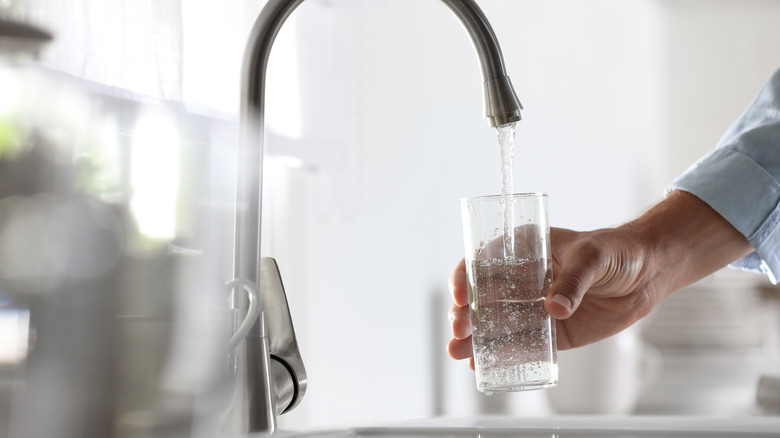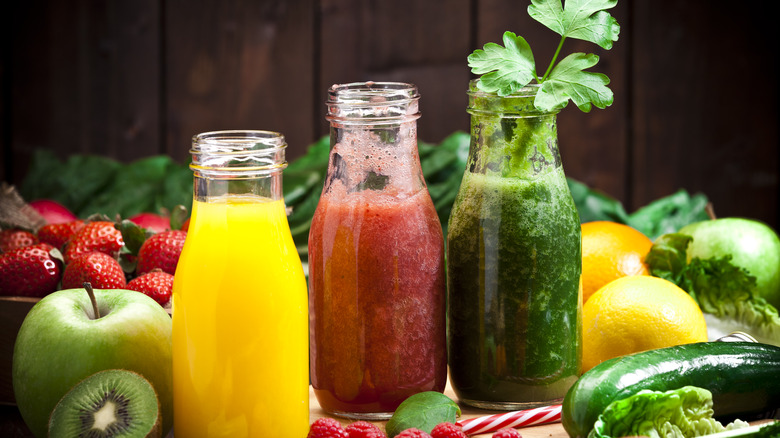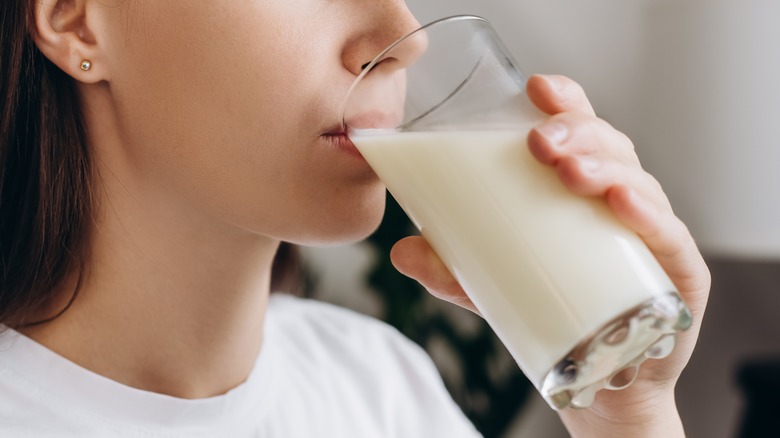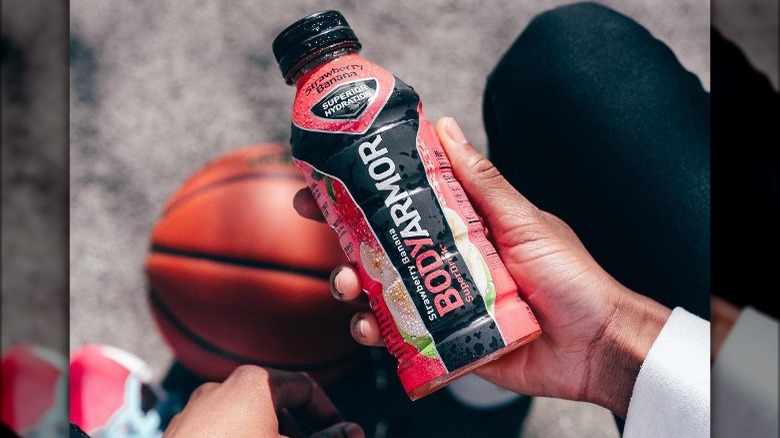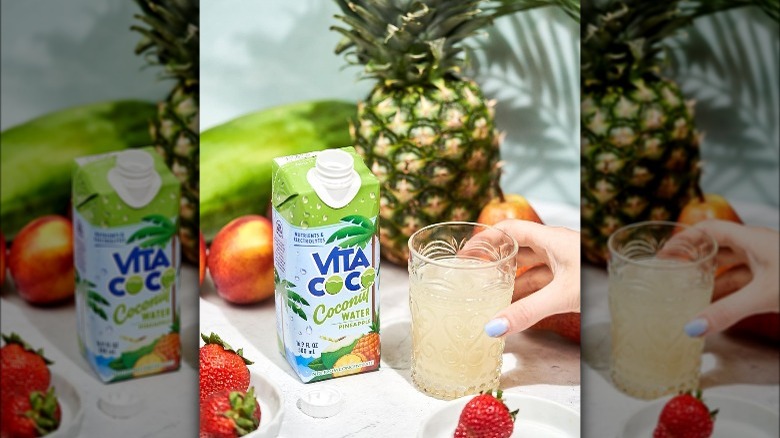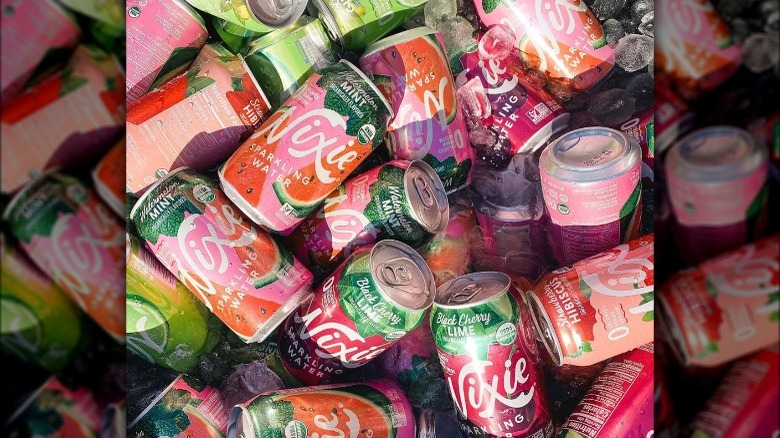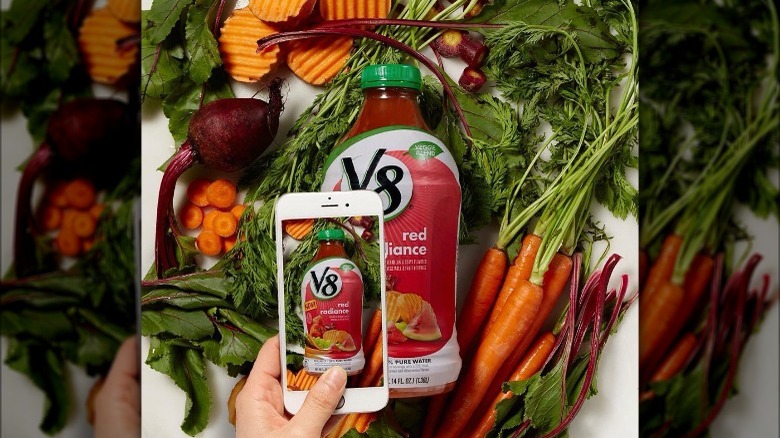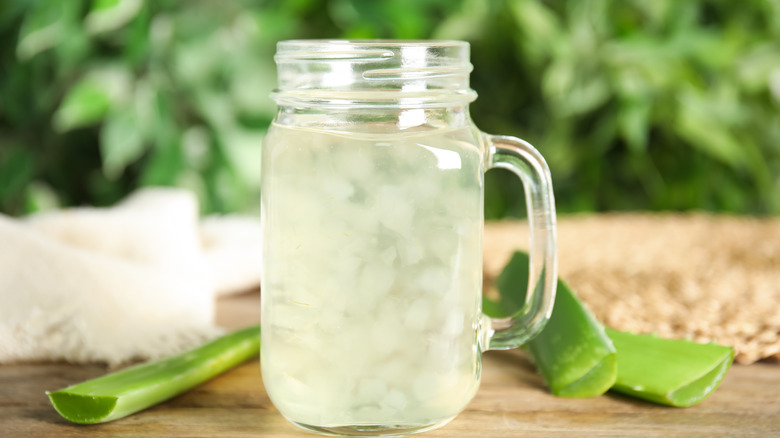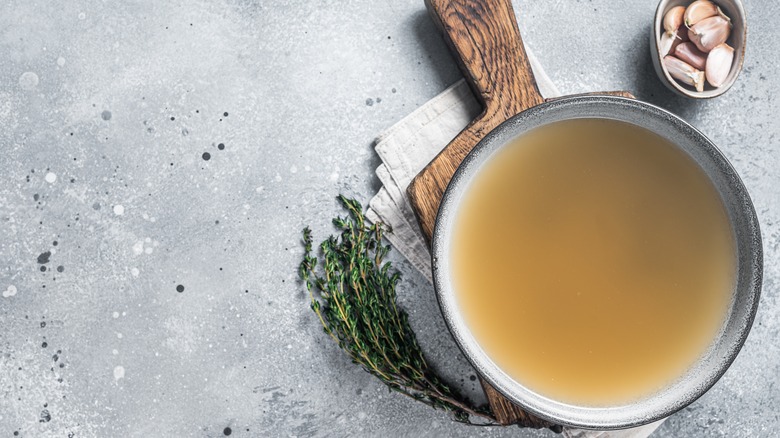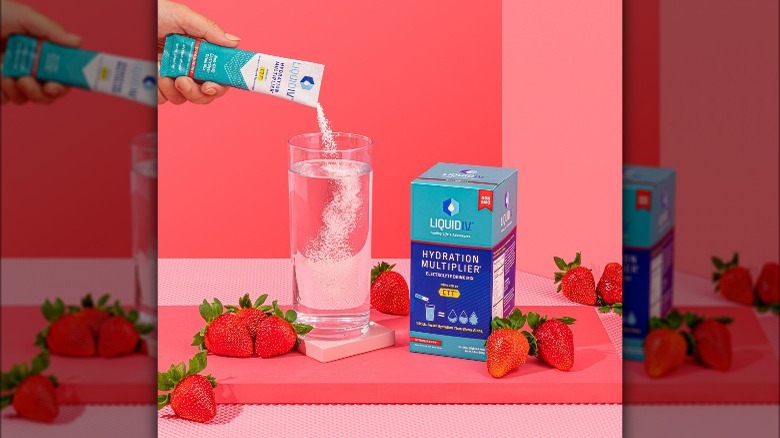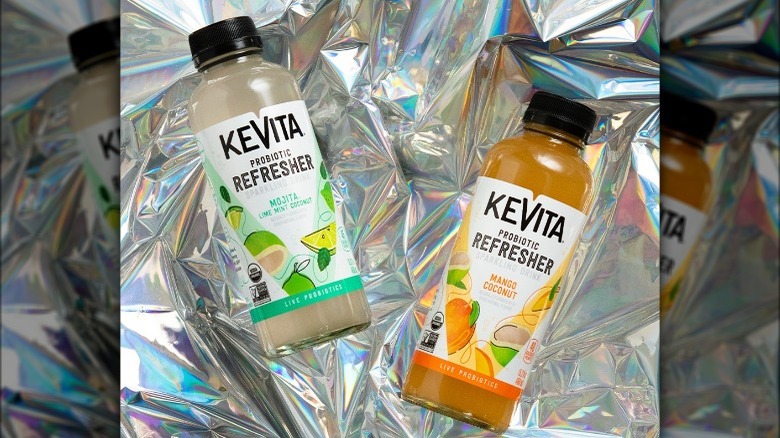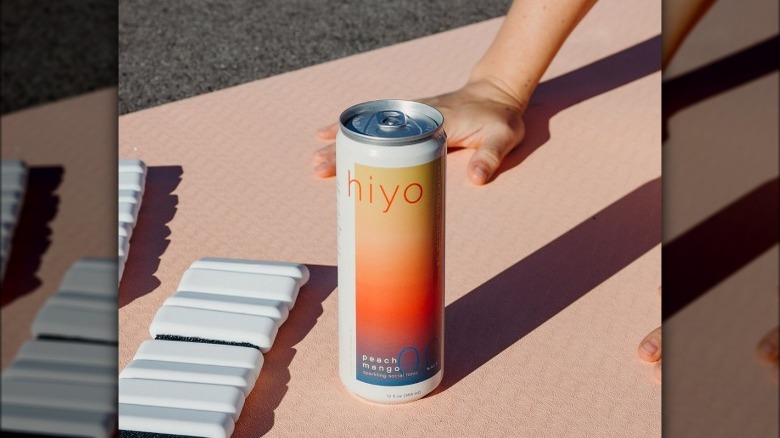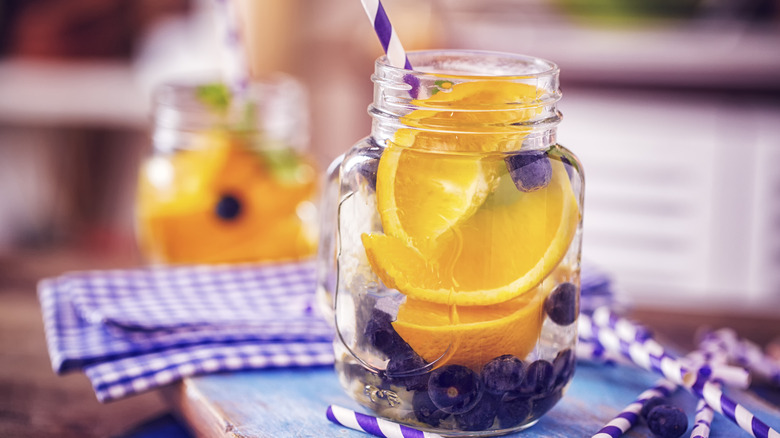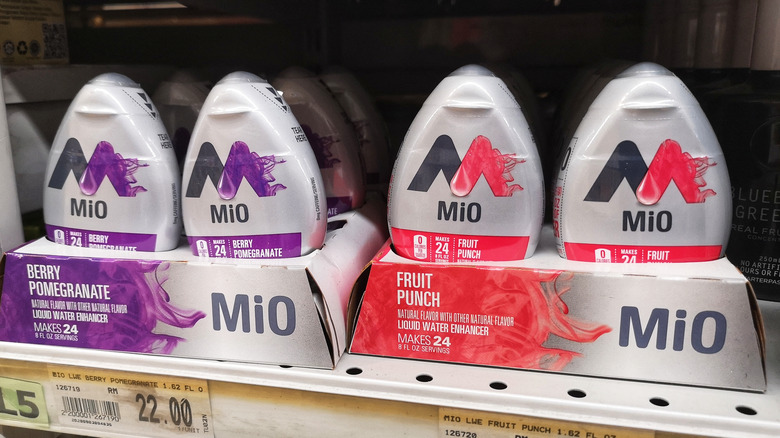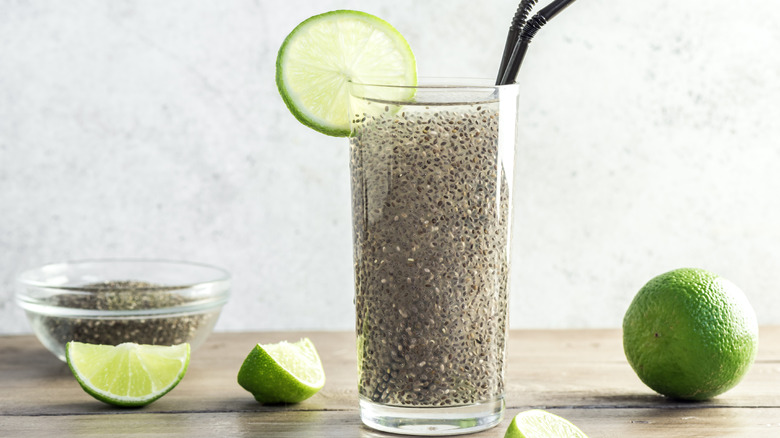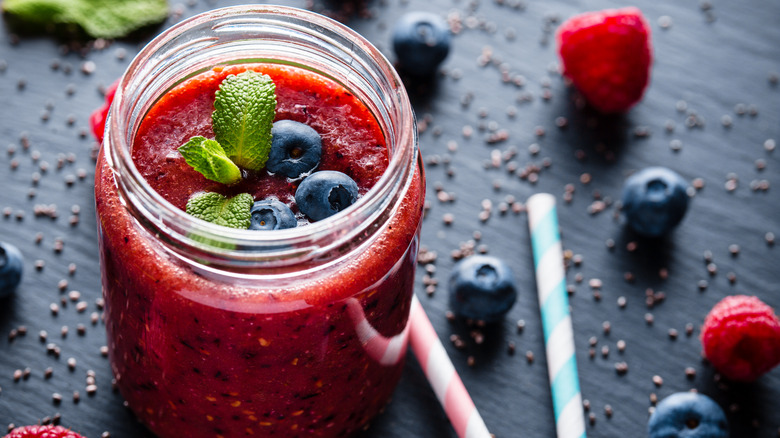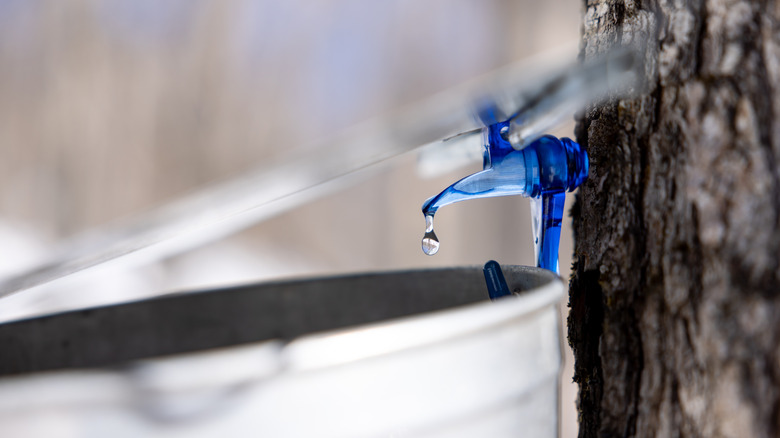16 Drinks To Keep You Hydrated That Aren't Plain Water
For years, a familiar refrain has been that drinking water is key to a healthy lifestyle. The human body is mostly comprised of water, so it makes sense that rehydration would be as necessary a part of everyday life as eating and sleeping. Anyone who has experienced fatigue from strenuous exercise (or a hangover after too much alcohol) knows the effects dehydration can have on the body, ranging from a mild headache to severe organ complications. In fact, not drinking enough water can cause complications leading to death.
Plain water is so much a part of everyday life that we've deferred to it as the default, and only, option for hydrating the body and maintaining a balanced diet. However, some research shows that despite popular belief, pure water isn't always the best drink to grab to fuel your body. We've rounded up 16 of the best drinks to grab to keep the body hydrated besides plain water. We're by no means suggesting that you cut drinking water out of your daily routine. But adding different drinks to your diet can end up resulting in even more positive health benefits than just the plain stuff. Plus, everything on our list contains much more flavor than a glass of water from the tap.
1. Fruit juice
A great alternative to water that also nourishes your body with added vitamins, and minerals is fruit juice. A lot of health drinks, including fruit juices, boast about their electrolyte content. Electrolytes are compounds like sodium, potassium, magnesium, and more. Essentially, electrolytes keep a person's bodily fluids balanced and help the different cells each function properly. It's why if you work out or have a hangover, replenishing your body with electrolytes can help promote recovery better than water alone.
Fruit juice is loaded with vitamins and electrolytes that are essential to replenish your body, such as orange juice rich with Vitamin C which can promote a strong immune system. Additionally, the average orange juice is comprised of 90% water, so it's nearly just as hydrating as a glass of water alone. Grapefruit juice, pineapple juice, tomato juice, and more all are vitamin-packed drink options to add to your daily diet, especially in the morning as a kickstart to the day. One myth is that eating fruit is twice as hydrating to the body as water, which has been proven to be false. Fruit and fruit juice can be a beneficial addition to a person's diet to help keep them hydrated, but they should never totally replace a person's water intake for long periods.
2. Milk
Contrary to popular belief, milk is one of the most hydrating drinks you can opt for. Whether you like skim or full-fat milk, both varieties contain a significant water content in general. When you consider the fat, lactose, and sodium content of milk, these factors will help to balance the fluids in the body. Additionally, the nutrients/water from the milk will stick around in the body for longer than water, which is filtered out rather quickly, and ultimately results in your body absorbing more of it.
It's a fun fact to tell people that milk is arguably more hydrating than water. It's not common to see a person at the gym replenish with a tall glass of whole milk after a strenuous workout, but it might be a better option than water in some cases. However, it also doesn't provide a suitable swap for every glass of water. Milk contains a lot of calories, which can add up if a person is drinking eight glasses a day instead of water.
As with everything, it's important to equip your body with both milk and water in tandem in an attempt to keep yourself as hydrated as possible. Additionally, non-dairy milk, like almond milk or oat milk, is also as hydrating — if not more so — than water. These alternatives are made by blending the base ingredient with water to turn it into milk, so the body will still absorb all of that water along with any additional nutrients.
3. Sports drinks
Sports drinks are a common hydration replacement for water, as the average brand like Gatorade contains electrolytes and additional carbs to replenish the body after intense movement. It's why athletes are often used in advertisements for sports drinks, as they are the target consumer audience. However, due to the sugar content, sports drinks shouldn't totally replace water for most people unless they want to impact their physical health in negative ways, such as tooth enamel erosion. Sports drinks also contain sodium, which helps the body to retain water better, and many feature amino acids that can aid in muscle recovery.
Outside of the longstanding option of Gatorade, Body Armor is another popular sports drink brand that has the added plus of containing no artificial sweeteners in its bottled beverages. The brand also has zero-sugar Lyte options or Edge drinks that contain caffeine. For those who live an active lifestyle, incorporating a sports drink into your diet can help to keep your body at its optimal level of hydration.
4. Coconut water
One of the best alternatives to water for keeping hydrated on a hot day (or after a night out of drinking) is coconut water. Coconut water is the clear fluid in coconuts that is slightly sweet and nutty. Unlike coconut juice, it typically doesn't contain any purée from the actual fruit. Coconut water is high in a variety of electrolytes, particularly potassium, that can aid in keeping low blood pressure. Hydration is also an essential aspect in preventing kidney stones, and the electrolytes in coconut water help the body filtration process function even better to avoid a trip to the hospital as a result of one.
Vita Coco is a common coconut water brand you can find at the average grocery store and can be a fun drink swap for water. The brand has an original variation, which is pure coconut, pineapple, and peach mango flavors to make it even tastier to do something good for your body.
5. Flavored sparkling water
Technically, sparkling water is just water fizzed up with carbon dioxide. Contrary to what some might believe, sparkling water is just as hydrating as the still version. It might be more beneficial to some people than regular water, as the fun flavors will encourage them to consume more throughout the day than the plain stuff.
The body will still ingest the water just the same, whether or not it has a bit of gas in it. Researchers even believe the carbon dioxide dissipates once it hits those gases in your stomach, so it's all just water to your digestive system. It may not be better for people working out or with gastrointestinal issues, as the carbon dioxide can cause bloating and result in a person drinking less seltzer than they would still water.
LaCroix is one of the most popular grocery store brands of sparkling water that is lightly flavored with options like tangerine, apricot, and peach-pear. Nixie is one of the newer options on the market that's organic and offers flavor mashups like watermelon mint or strawberry hibiscus. A final sparkling water brand worth seeking out is Sanzo, which offers bubbly water in Asian-inspired flavors like yuzu and calamansi.
6. Vegetable juice
Similarly to fruit juice, the juice pressed from fresh vegetables can provide a double-whammy benefit of hydration and a hit of vitamins. Pressed juice is the best option, as it helps to retain all of the nutrients in each vegetable while offering all of that water content. Also like fruit, each vegetable contains a varying amount of water. Some of the most water-dense vegetables are celery, cucumber, leafy greens, and bell peppers, which can also help keep the body hydrated when eaten fresh. Some people have juicers at home to make their own fresh-squeezed vegetable juice, but it's also a healthy treat from a juice bar that can keep you feeling hydrated and energized for the remainder of the day.
V8 is one of the longest-available vegetable juices on the market. Famously, one of the brand's 8 oz. cans contains two servings of vegetables like beets, carrots, tomatoes, spinach, and more. The brand has gone on to expand its line of flavors, including both fruit and vegetable juices, and the drinks can be a great addition to the diet of anyone who is looking to keep healthy and hydrated.
7. Aloe vera juice
Aloe vera juice isn't the most popular drink on the list, but the underrated beverage can provide plenty of added health benefits that include keeping you hydrated. Aloe vera juice is either made from the green outer leaf or by mixing aloe vera gel, which is often used as a topical medicine, with water or citrus juice for added flavor. Aloe vera has a plethora of antioxidants and antimicrobial properties. Some people believe it can help to promote a healthy digestive system and clear skin, but the studies aren't clear-cut.
There is also a laxative effect that's been tied to the drink when it's made out of the green outer part of the plant. It's important to note that, in large amounts, the aloe vera juice made with the outer leaf can be unsafe. The mainstream bottled versions just contain trace amounts that provide a safe amount of vitamins and minerals when enjoyed in moderation. This is also something you can easily make a home by cutting up the aloe vera leaf and mixing it with water, juice, or added sweeteners, and you can boil it over the stove for a DIY aloe vera tea drink that's bound to help settle your stomach. At the very least, it's sure to help keep your daily water intake on track.
8. Bone broth
Bone broth is one of those nutrition fads in recent years that was seemingly everywhere for a while. It's not the miracle health cure that some advertisements may suggest, but the trendy ingredient (also known as stock) does have plenty of benefits for the body. Bone broth is made out of claws, knuckles, tendons, and bones from different animals, depending on the recipe, to make a rich soup. Soup made with stock from bones has long been associated with healing, and bone broth can also help to replenish a person's electrolytes.
Bone broth is a naturally hydrating liquid with the added benefit of sodium, which is key for hydration retention. It doesn't matter if the broth is made from the bones of chicken, pork, beef, or fish — the nutrients that seep out of the bones into the broth are undoubtedly a boost to your health. Again, it's not that everyone should replace their daily water intake with bone broth. However, swapping out one glass could help your body better absorb all of the water and electrolytes you are consuming throughout the day.
9. Electrolyte mixes
The main marketing tactic for electrolyte drink powder mixes is hydration. Whether it's after a hot day in the sun or too much alcohol, brands like Pedialyte and Liquid IV boast added electrolytes like sodium, glucose, and potassium to help your body better absorb the water it's mixed into. Pedialyte is the old-school option, available in liquid bottles and drink mixes, that is full of nutrients, and is even recommended to help keep babies hydrated.
The flavors of Pedialyte are pretty typical like berry or orange, so Liquid IV is for those with a more sophisticated palate. Both brands boast similar benefits of electrolytes and vitamins, but Liquid IV offers them in flavors like piña colada and Seaberry. The list of brands making variations of electrolyte drink mixes is extensive, but all of them can be an appropriate way to replenish your body when just water isn't cutting it. Additionally, they can also be very useful when you drink them before a long day of exercise or consuming alcohol to prevent your body from getting so dehydrated in the first place.
10. Kombucha
Kombucha is another buzzy health drink that gets a lot of praise, but it can also help you keep your daily fluid intake on par while boasting digestive health benefits. Kombucha is a fermented tea, usually made with a brew of sugar, black or green tea, and Scoby, or the bacteria and yeast culture that adds all of those sought-after probiotics. Kombucha can help to support a healthy immune system as well as gut health when you drink it alongside water. It's a great option for someone who wants to drink something a little fancier than water but wants a healthier option than a sugary soda or an alcoholic cocktail.
There are so many popular kombucha brands on the market. Health-Ade is one bottled option with a flavor for nearly every palate. KeVita also has an extensive line of gut-boosting drinks, from bubbly kombucha to vinegar tonics. For those who prefer something without the funky fermentation, there are also probiotic soda options like Culture Pop that provide similar benefits but are a bit more flavorful than plain water. At their base, all of these probiotic health drinks are made with plenty of water, so they'll undoubtedly help to keep you hydrated.
11. Non-alcoholic canned drinks
Finally, unlike its alcoholic counterpart, the category of non-alcoholic drink options also usually includes several drinks that will help to boost a person's hydration levels. Many of the non-alcoholic options combine flavor with function, and the base is often majorly comprised of water anyway. A prime example at work is Hiyo, a functional tonic that markets itself as "better than alcohol." The brand uses a unique list of ingredients including nootropics, botanicals, and adaptogens in its canned drinks to help boost your mood and make you feel calm without the buzz of alcohol. Ghia is another popular nonalcoholic brand with aperitif cocktails that can keep you hydrating while tricking yourself into thinking you're drinking booze.
Some studies even show that nonalcoholic beer is a suitable swap for water when it comes to hydration. Nonalcoholic beer typically has sodium and potassium, so it can even be quicker to hydrate your body than regular water after exercise. It might sound crazy, but it's not the worst idea in the world to chug a non-alcoholic beer before a workout to keep your body hydrated. Mainstream beer brands like Dos Equis, Heineken, and Samuel Adams all sell nonalcoholic versions of their brews that can provide the same great flavor as the originals, just with more hydrating qualities.
12. Infused water
We love a pleasing aesthetic, and there's no better Insta-worthy way to hydrate than infused water. Floating any combination of fruit, vegetables, or herbs in a glass or pitcher of water creates a gorgeous look while lending flavor, vitamins, and fiber. The possibilities are endless: cucumber with melon, strawberries and mint, or watermelon with lime would all be refreshing and delicious. Whether you let the fruit sit in the water for a while before drinking or plop it in and drink up is your choice, but be sure to eat or strain out the solids within a day to avoid any nasty surprises.
Infused water is customizable to your preferences. Make a sangria-like drink by dropping slices or chunks of produce into the water or summon your inner mixologist and muddle add-ins so they release juice. If you don't feel like fishing around in your drink for a snack, you can still get all those vitamins, fiber, and micronutrients by pureeing whole lemons, limes, or berries and adding them to the pitcher. This will make your water pretty and make upping your fluids a snap.
Remember, even if you don't have fresh produce, you can infuse water with strong juices like açai, pomegranate, cranberry, or black cherry. Since undiluted juice has relatively high amounts of sugar and calories and lacks the fiber of fresh fruit, using it to elevate plain water while keeping your health goals on track is a win-win.
13. Water enhancers
A little flavor goes a long way toward reaching hydration goals, so water enhancers are perfect for anyone who gets bored of drinking plain water. Water enhancers come in powders, drops, and, in the case of Cirkul, even cartridges that deliver flavored water with every sip. Many brands are calorie- and sugar-free, and some add vitamins or contain caffeine for those who want an energy boost along with water. Flavors can mimic anything from berry lemonade to fruit punch. Whether you make a pitcher or use them by the glass, water enhancers can make drinking water more fun.
Of course, water enhancers are a double-edged sword when it comes to healthy hydration. Zero-calorie water enhancers contain artificial sweeteners, which many people are wary of, and those that contain sugar carry their own health issues. Artificial flavors and colors, propylene glycol, sucralose, and preservatives are all found in water enhancers and have raised eyebrows and concerns about long-term health effects. That said, water enhancers are FDA-approved and are considered safe to drink in moderation; in other words, as long as your hydration needs are also met with water, juice, milk, soups, and water-rich foods, you don't need to worry about using a flavor packet once in a while.
14. Chia seed water
Chia seeds are on trend among those striving for a healthful diet. Chock full of fiber, protein, antioxidants, and omega-3s, these seeds from the Salvia hispanica plant are a perfect addition to smoothies, oatmeal, and baked goods. TikTok has endless recipes for chia pudding so you can enjoy a sweet treat that aligns with your nutritional goals, and content creators advocate sprinkling chia seeds on everything from ice cream to avocado toast for a boost of fiber that keeps you feeling full so you don't reach for snack foods.
One of those TikTok-approved recipes is a boon to hydration: chia seed water. You can make it in minutes — add a tablespoon of chia to water and let the seeds soak for a while, or if you're feeling fancy, jazz it up with honey and a squeeze of citrus. Since chia seeds absorb water (about ten times their mass), they grow into jelly-like blobs, similar to the tapioca pearls found in bubble tea. While some might find the texture a little weird, even intolerable, the nutrients in chia seeds may help with hydration, nutritionist Kerri Ferraioli told Business Insider.
15. Homemade smoothies
Smoothies, defined as any combination of fruits and vegetables blended with water, yogurt, milk, or protein powder, are a great way to pack extra fiber, vitamins, and minerals into your diet, and they're especially beloved as a way to avoid salad or a pile of Brussels sprouts on your dinner plate. While buying pre-made smoothies, whether at the grocery store, chain smoothie bar, or online, is convenient, the cost and the tendency for commercially made smoothies to have added sugar and fat to make them taste delicious means that making your own is better for your wallet and your waistline.
Smoothies can be customized with any ingredients you love. Blended with milk, juice, or yogurt, they can be a meal as you hydrate, and you can use plain water if you want a lighter drink. On hot days, use frozen fruit or ice cubes to whip up a slushy treat to cool you off while providing lots of water for your body.
16. Maple water
Maple syrup is the favored topping for pancakes and waffles and is something you're likely to have in the pantry, but you may not appreciate the intense labor that goes into making it. Tapping maple trees, collecting sap, and boiling it for up to two days to condense it is challenging. The fact that 10 gallons of sap yields just a quart of syrup makes it easy to understand how the composition of the sap changes during this process; maple sap is 98% water and only 2% sugar, but after it's boiled into syrup, the sugar content climbs to a whopping 67%.
Enter maple water, otherwise known as fresh maple sap. While it may sound odd to drink maple sap, Drink Simple, one company that sells maple water (flat or sparkling), points out that maple trees make sap by absorbing water enriched with nutrients from the earth. With just 15 calories in an 8-oz. glass, maple water is lightly sweet with natural sugars, refreshing, and has trace amounts of minerals to boot, allowing the body to absorb the water at a faster rate than drinking plain water. While we don't suggest making maple water your primary source of hydration since it contains sugar and carries a hefty price tag, it's a nice treat, especially in hot weather or during an intense workout.
